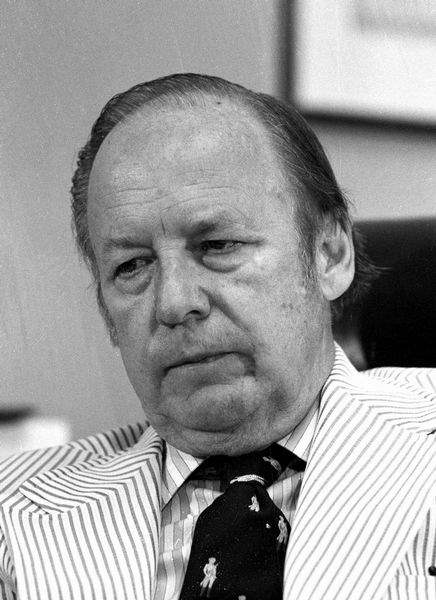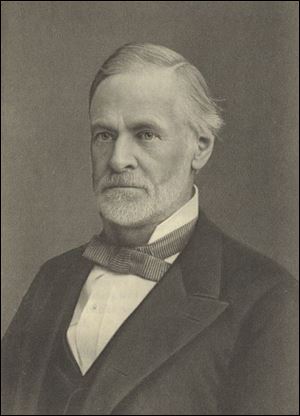
Famous, infamous have represented Ohio in Congress
3/2/2003
Hays: Fell from power in sex scandal.
CB / AP

Sherman: He backed anti-trust laws.
Two families — the Harrisons and the Tafts — built political dynasties that dominate the state's 200-year political landscape, but Ohio sent many to Washington who made major contributions to the nation.
William Henry Harrison was from an aristocratic Virginia family — his father signed the Declaration of Independence — but his fame was won on the Northwest frontier as an Indian fighter. During the War of 1812, he was the general who defeated Tecumseh and his British allies at the Battle of the Thames in Canada.
He was the first person to represent in Congress the territory that would become the state of Ohio when in 1799 he was appointed to Congress by President John Adams. In 1840 he was elected the ninth U.S. president. He died after 32 days in office.
Harrison's son, John Scott, served Ohio in the 34th and 35th Congresses. William Henry Harrison's grandson, Benjamin, was a U.S. senator from Ohio before becoming the 23rd president — the only president whose grandfather was also president.
While the Harrisons dominated the first 100 years of Ohio politics, the Tafts dominated the second. William Howard Taft, elected president in 1908, became the only man to serve as chief justice of the United States after leaving the White House.
Taft's son, Robert A. Taft, was elected to the U.S. Senate in 1939, where he served until 1953. He sponsored legislation known as the Taft-Hartley Labor Act, which was passed in 1947 and grants the federal government the power to obtain an 80-day injunction to halt labor strikes that it deems a peril to national safety.
Like his father, Robert Taft ran for president but in 1948 failed to win the GOP nomination. He again failed in 1952, when Gen. Dwight Eisenhower won the party nod and the presidency.

Hays: Fell from power in sex scandal.
Robert Taft, Jr., also won a seat in the U.S. Senate. His son, Bob, is now in his second term as governor of Ohio.
“In both of those families there was an ethic of public service,” said John Green, director of the Ray C. Bliss Center of Applied Politics at the University of Akron. “Both families had very practical politicians. They were not great visionaries, but they went about their work with great skill.”
Another Ohioan responsible for a major piece of federal legislation was Sen. John Sherman of Richland County, the namesake of the Sherman Antitrust Act of 1890 — the first federal legislation prohibiting trusts, which were used at the time to create monopolies. The act authorized the government to dissolve such trusts.
Sherman served separated terms in the U.S. Senate. The first was from 1861 to 1867. The second was from 1881 to 1897.
His brother, William Tecumseh Sherman, gained fame during the Civil War as the Union general who led his men on a sweep across the South to the Atlantic Ocean, demolishing Atlanta and many other cities and helping to bring an end to the war.
John Glenn, one of the original seven Mercury astronauts, was the first American to orbit the Earth and is perhaps Ohio's best-known modern congressman. After retiring from the space program, he was elected to the U.S. Senate on his second attempt. He served four terms until his retirement in 1999. In 1998 he returned to space aboard the shuttle Discovery, becoming the oldest man in space.
He mounted an unsuccessful run for the Democratic nomination for president in 1984.
Two men represented northwest Ohio in the House for more than a quarter-century. Democrat Thomas William Ludlow Ashley served from 1955 to 1981, and Republican Delbert Latta served from 1959 to 1989. Mr. Ashley is the great-grandson of James M. Ashley, a firebrand abolitionist who served five terms in the House from Ohio beginning in 1859.
Most Ohio congressmen discharged their duties with honor, but some developed infamous reputations.
John Smith, one of two men elected to be Ohio's first senators, developed a friendship with Vice President Aaron Burr that, through no fault of his own, led to his political downfall.
Burr and James Wilkinson, a U.S. Army officer secretly in the pay of Spain, planned an invasion of Mexico and capture of western U.S. territories to comprise a new nation. But, Wilkinson betrayed Burr to President Thomas Jefferson.
Smith was forced to resign his Senate seat in shame, though authorities never established a connection between Smith and Burr's scheme.
In his 14 terms in Congress, Wayne Hays of Flushing, Ohio, rose to become one of the most powerful men in the House of Representatives. He fell from power in a 1975 sex scandal when a “secretary” on his staff payroll declared that she could not type or even answer the phone. Elizabeth Ray, a former Miss Virginia, later posed for Playboy and wrote a book saying that she had been the congressman's mistress.
In 1976 Mr. Hays was removed as chairman of the House Administration Committee and later forced to resign as a result of the scandal and allegations of misuse of government funds.
The most recent political embarrassment was James Traficant, who was first elected to his Youngstown seat in 1984 but was expelled last year after conviction on 10 felony charges, including bribery, receiving illegal gratuities, fraud, obstruction of justice, filing false tax returns, and racketeering. He was sentenced to eight years in prison but continued to maintain his innocence even after the trial.